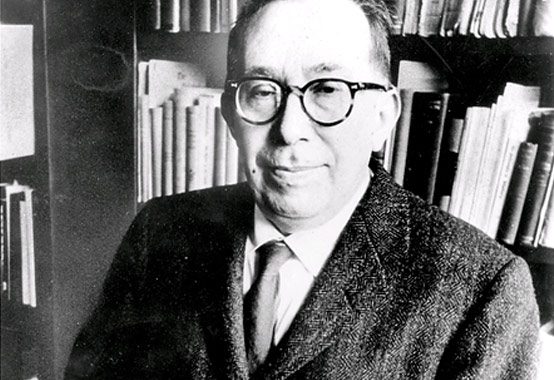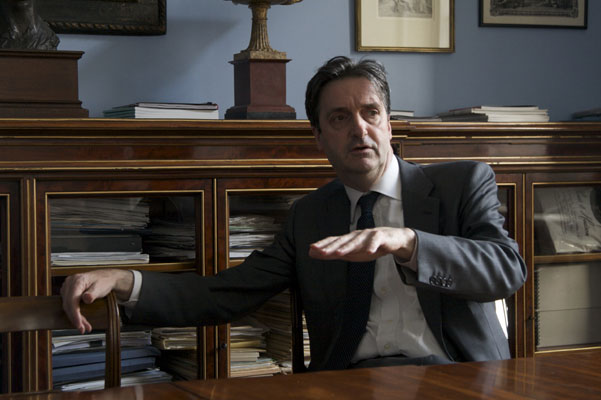

Leo Strauss was a political theorist who sought hidden messages in philosophical texts. He thought that great thinkers wrote esoterically, hiding their true meaning to protect themselves. Their message was reserved for an elite who had to grapple with deliberate self-contradiction and search for hidden clues behind the exoteric text.
I think National Gallery director Nicholas Penny is a Straussian. He says one thing, but means another. If we pay close attention we can discern his hidden messages. Penny is in a difficult position. He is an intelligent and cultured man constrained by philistines. He must deal with convoluted internal politics, barbarians in government and a board of trustees of, let us say kindly, mixed ability. He is above all a scholar rather than a politician, and he has learned to express his views cannily, especially after first being passed over for the NG directorship, when he spend a few years at Washington DC's National Gallery of Art.
I find it interesting that almost everyone I respect thinks Penny is brilliant, even when we disagree on the merits of Penny's specific arguments. Bendor Grosvenor recently posted his Apollo interview on Art History News. We both like it, though he spoke in favour of photography in museums (which I oppose) and warned of the dangers of travelling exhibitions (which Bendor Grosvenor thinks exaggerated). Penny has a knack for neutralising critics and carrying people along even when they disagree with some of his views. But I have a sneaking suspicion that he is actually with me in opposing photography.
In the Apollo interview he defended photography because it's what visitors expect. I'm opposed to photography, but I recognise there are plenty of good arguments for allowing it. This isn't one of them. It's not just a bad argument, it's totally antipathetic to Penny's approach, which is about raising standards not deferring to existing prejudices. The NG would be full of Thomas Kincade and Damien Hirst if they ran it by opinion poll. Penny has consistently championed deepening engagement, but the NG's own statements about encouraging social media interaction and the popular excitement about museums selfies encourages a shallower encounter with art. Have a look at the YouTube clip of a random two minutes in front of Van Gogh's Sunflowers to see the effect. I can't think of anything more inimical to Penny's vision for the NG. The Straussian reading is that Penny is deferring to professional demands on him and publicly standing behind the NG's decision, but doing it in a way that makes clear to close readers that he actually takes the opposite stance because he's evidently too smart to make such a feeble argument.
Taking it a step further, is the NG's acquisition strategy also a Straussian ruse? Penny is a brilliant art historians with a great eye, but the NG's acquisitions have been lamentable. Is this a ruse to distance himself? No one could believe that Penny was responsible for a second rate pictures by Maulbertsch and Lawrence. And he couldn't possibly have thought the Bellows was good value for money, bought at a time when two of the richest people in the history of the world are ardently bidding up the price of his pictures. Did he deliberately leave the trustees to make decisions without adult guidance, to see how badly they'd do? I wonder if in years to come they'll dig up meeting minutes in the NG archives that will rescue Penny's reputation. I can imagine him commending Le Brun to the acquisition committee, with some genial old aristo or well-connected financier replying "Le Brun? Who's he? Hmm, French you say. No, no Nick old boy ... Tommy Lawrence, that's the ticket!". It's been a costly strategy, because we've missed out on so much great art. Le Brun's Everhard Jabach and his family, bought by the Met from a British collection, is a particularly painful loss. But The NG's loss is the Met's gain, so I can't get too upset by it. Perhaps he's just being pragmatic about where paintings end up, in this age of cheap travel.
We already knew that Penny was brilliant. Recent comments make me think he might be even smarter than we'd realised.
It's absurd to call the acquisitions lamentable of a reign which includes the purchase of Titian's great Diana paintings. It also misrepresents the Bellows acquisition to ignore that the money which bought it was American and not available for the Jabach picture which was lost thanks to the HLF money going to the murky deal for the van Dyck self portrait.
ReplyDeleteThe Titians had been universally acknowledged as the highest priority acquisitions for the nation's collection for generations. It was inconceivable that heroic efforts wouldn't be made to retain them, and it is in my view simply serendipitous that they came to market on Penny's watch. I also despise the arrangement involved, which requires regularly shunting them between London and Edinburgh - something that Penny must also be concerned about. As to the Bellows, we'll never know the circumstances of the American funds and the restrictions on their use. We know Penny wanted representation of American art, and rightly so in my view. But who knows how much negotiation there could have been around the restricted gift of funds.
Delete